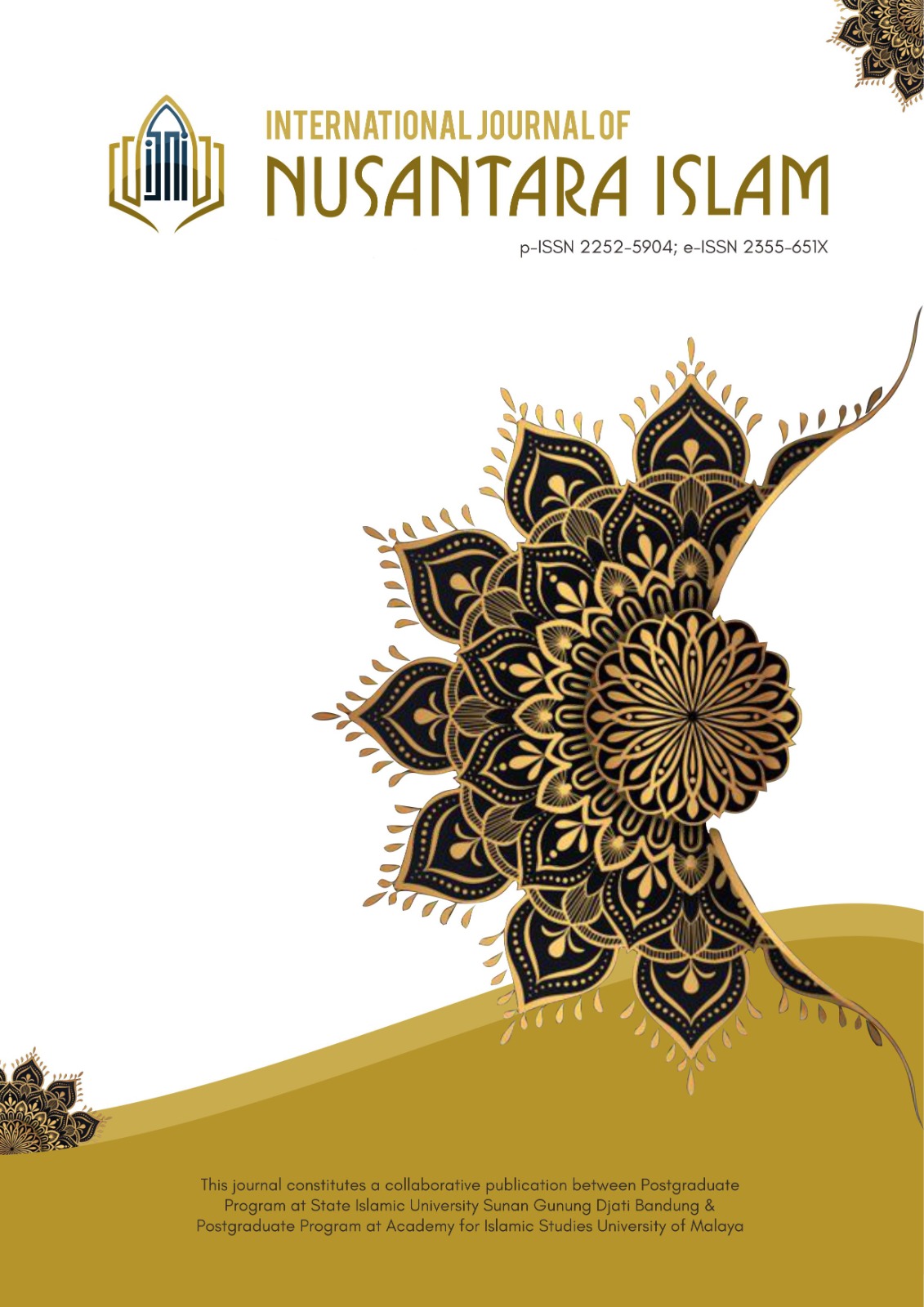Inabah Leadership System in Improving the Role of Service for the Victims of Narcotics, Psychotropic and Addictive Substances through the Tarekat Qodiriyah-Naqsabandiyah
Main Article Content
Abstract
Article Details
The Authors submitting a manuscript do so on the understanding that if accepted for publication, copyright of the article shall be assigned to International Journal of Nusantara Islam, Sunan Gunung Djati State Islamic University.
The copyright encompasses exclusive rights to reproduce and disseminate articles in all forms and media, including reprints, photographs, microfilm, and similar reproductions, as well as translations. Some or all of the contents of this journal can be stored in databases and transmitted in any form and media without the need for written permission from the International Journal of Nusantara Islam, Sunan Gunung Djati State Islamic University.
The Editors and the Advisory International Editorial Board make every effort to ensure that no wrong or misleading data, opinions or statements be published in the journal. In any way, the contents of the articles and advertisements published in the International Journal of Nusantara Islam (IJNI) are sole and exclusive responsibility of their respective authors and advertisers.
References
Abrasyi, Muhammad Athiyyah, 1994, Dasar-dasar Pendidikan Islam, terj, Bustami Abdul Ghani, Jakarta: Bulan Bintang, Cet. III.
Aceh, Abu Bakar, (1992), Pengantar Ilmu Thariqat, Solo: Ramadani.
Al-Naquib, Al-Alatas, 1990. Konsep Pendidikan Dalam Islam. Bandung: Mizan.
An-Nahlawi, Abdurrahman, 1992, Prinsip-Prinsip dan Metode Pendidikan Islam dalam Keluarga, di Sekolah dan Masyarakat, Bandung: CV. Diponegoro, Cet. II
Arikunto, S. (1998), Prosedur Penelitian, Jakarta: PT. Rineka Cipta.
Azra, A. (1999), Pendidikan Islam, Tradisi dan Modernisasi Menuju Milenium Baru, Jakarta: PT. Logos Wacana Ilmu.
Departemen Pendidikan Nasional RI, UU No. 20 Tahun 2003 Tentang Sistem Pendidikan Nasional, Jakarta: Sekretaris Jenderal Departemen Pendidikan Nasional.
Dhofier, Zamaksari, (1990), Tradisi Pesantren, Jakarta: LP3ES.
Fandy, T & Anastasia, D. (2003), Total Quality Management, Yogyakarta: Penerbit ANDI.
Handoko, T.H. (1995). Manajemen Personalia dan Sumber Daya Manusia, Yogyakarta: BPFE.
Hawash, Abdullah, (1980), Perkembangan Ilmu Tawasuf dan Tokoh-Tokohnya di Nusantara, Surabaya: Pustaka Setia.
Ma’arif, S. (2007), Revitalisasi Pendidikan Islam, Yogyakarta: Penerbit Graha Ilmu.
Muhadjir, N. (1996), Metodologi Penelitian Kualitatif, Yogyakarta: Rake Sarasin.
Mulyasa E. (2003), Manajemen Berbasis Sekolah Konsep, Strategi dan Implementasi. Bandung: Remaja Rosda Karya.
Nasution, Andi H., Dkk, 2002, Pendidikan Agama dan Akhlak Bagi Anak dan Remaja, Jakarta: Logos
Robbins, S.P. (1984), Management: Concepts and Practices. Englewood Cliffs: Prentice-Hall.
Satori D. (1989), Manajemen Berbasis Sekolah. Bandung: Basic Educational Project
Siagian, S.P. (1998). Pengembangan Sumber Daya Insani, Jakarta: PT. Gunung Agung.
Sudjana, D. (1996), Pendidikan Luar Sekolah, Wawasan, Sejarah Perkembangan, Falsafah, Teori Pendukung dan Azas, Bandung: Nusantara Press.
Sudrajat, H. (2002). Pendidikan yang Berorientasi pada Kecakapan Hidup (Lifeskill), Bandung: Yayasan Insan Citra.

